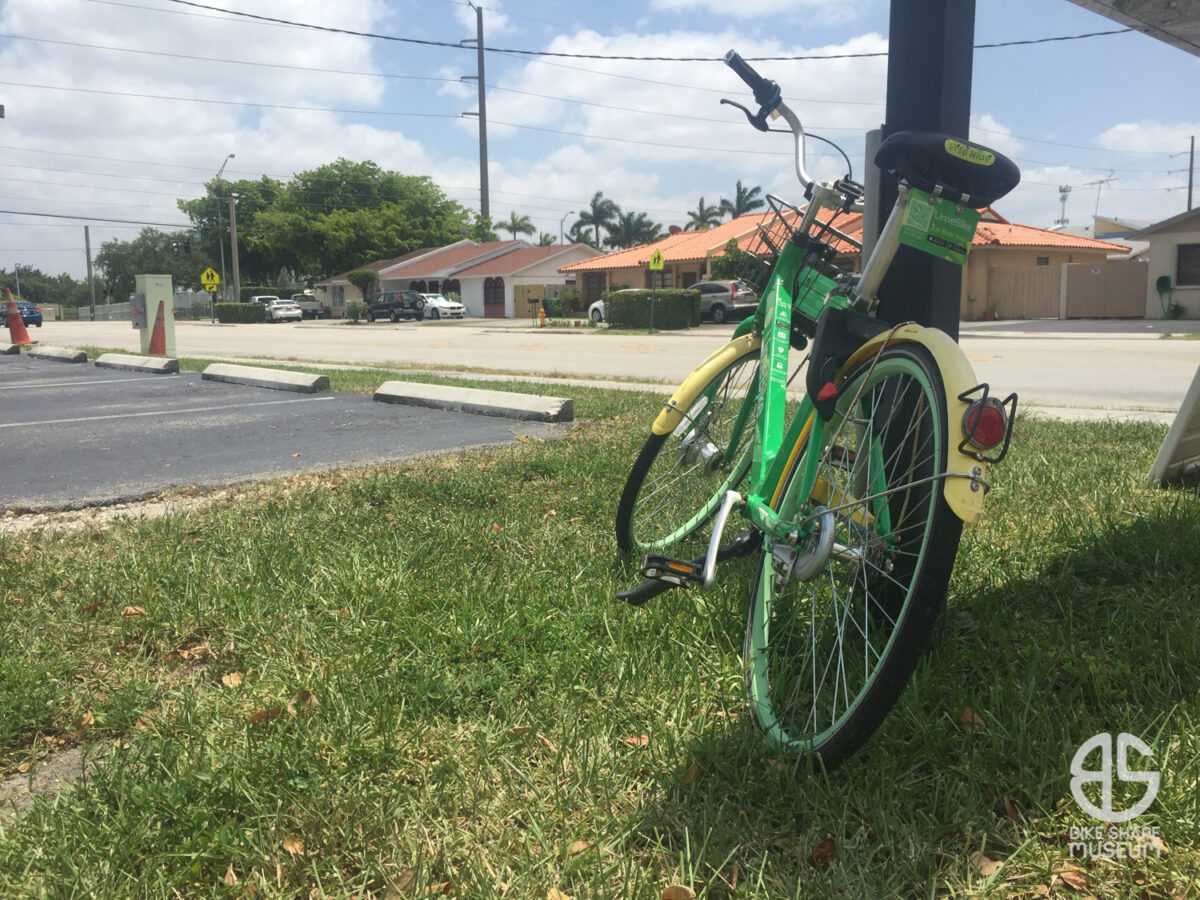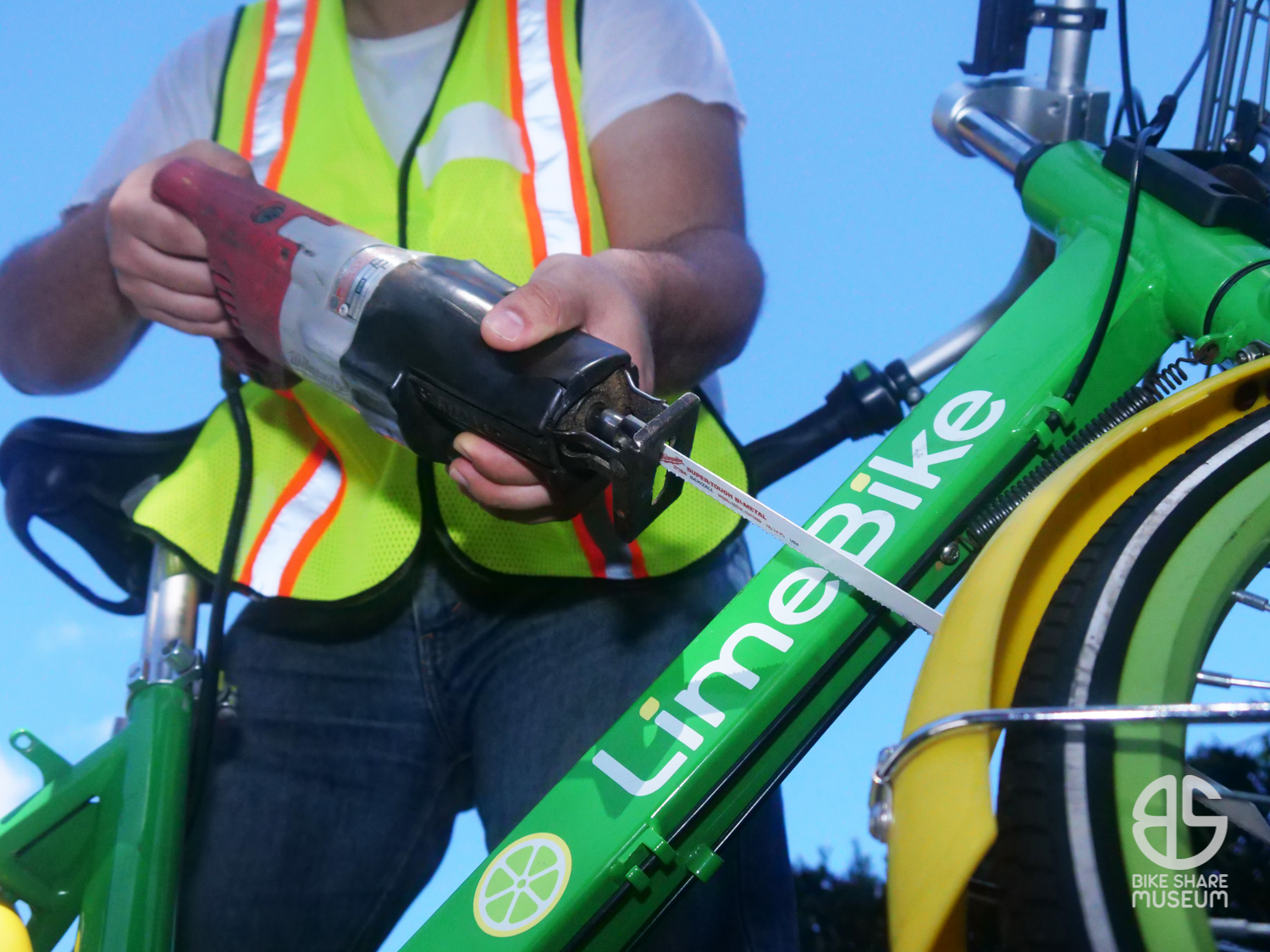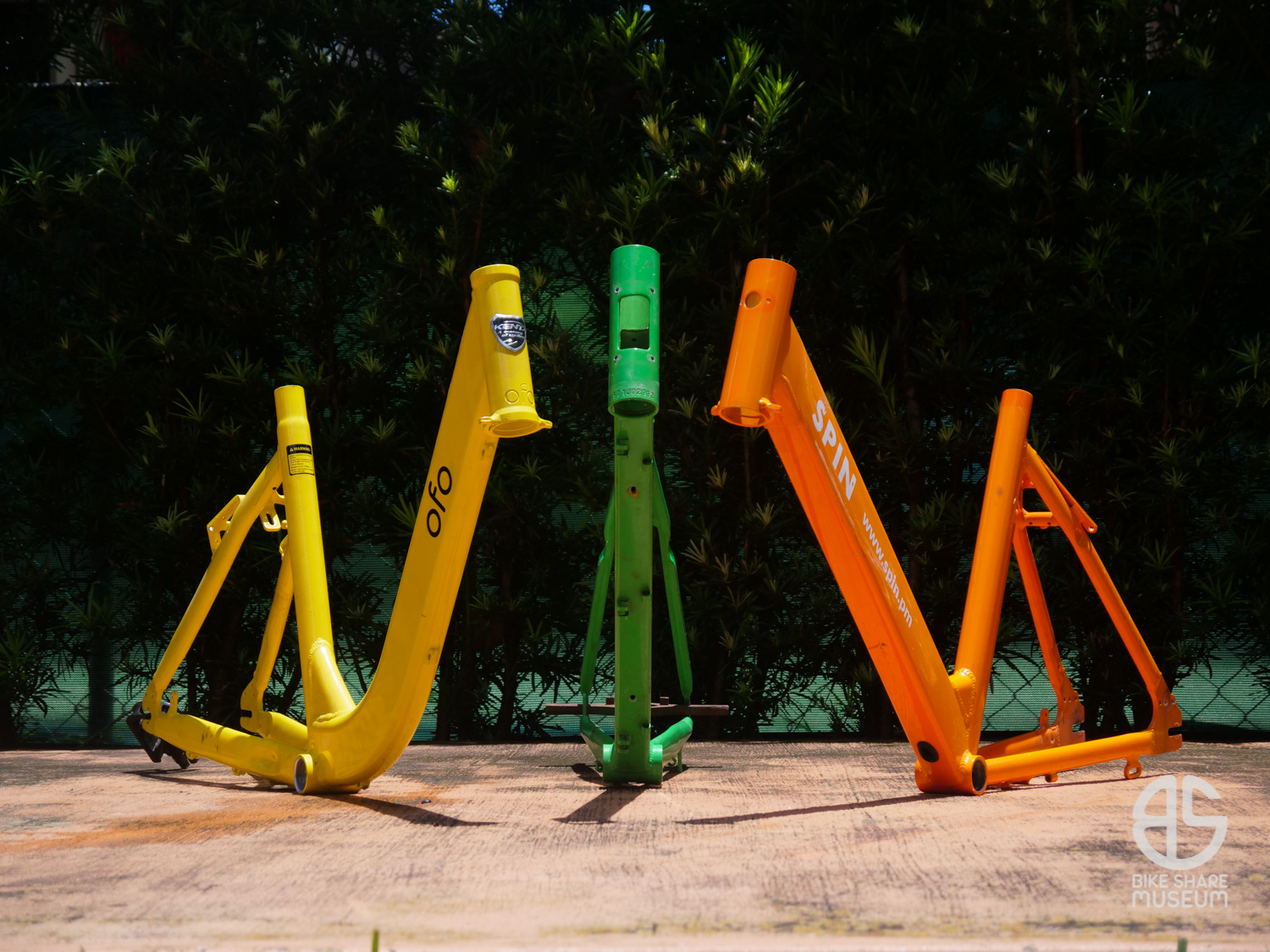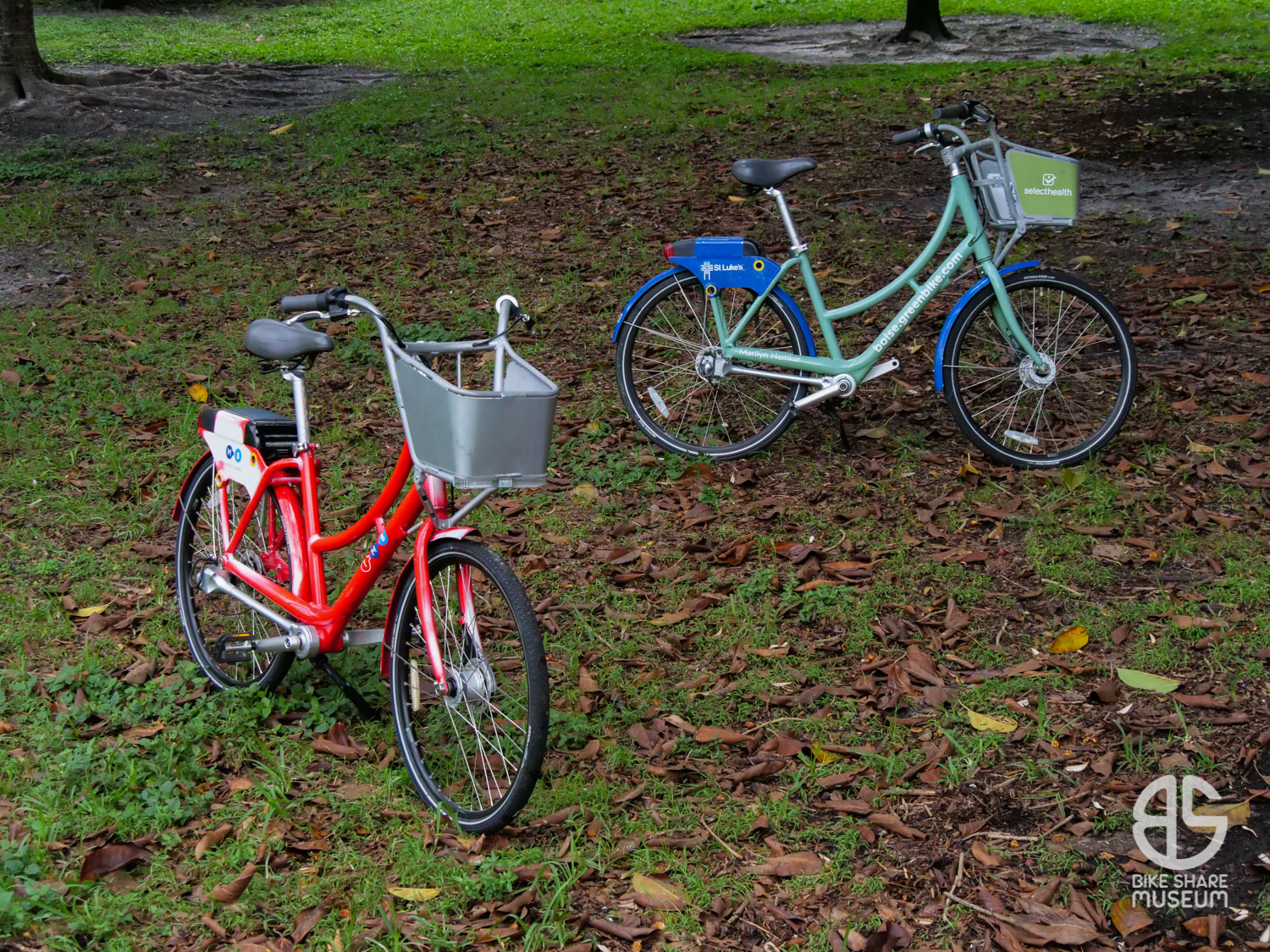They cut the LimeBikes up.
Foreword and update: When this article was released, the only source we could reach out to was one local Lime employee who explained the scrapping operation in Miami. While we appreciated his input, only *after* publicizing this article were we contacted by other Lime mechanics who pointed out a major omission in his explanation as to why they were cut up: In addition to the 12V Li-Ion battery pack in the lock, Lime’s were designed with a huge (13″ long) 3.7V 20Wh LiPo in the downtube that had to be removed from the bikes for safe recycling.
These batteries cannot be removed without removing the front fork, basket, and handlebar – a very time-consuming task when you have hundreds of bikes to prep – which is why the headtubes were cut off. In fact, if someone were to cut a LimeBike like the photo above – in the middle of the frame – the battery would explode. (DON’T TRY THIS, YOU’VE BEEN WARNED).
While this doesn’t excuse the waste, it helps us understand the reason for cutting the frames a bit better. This article is being kept up in its original form for reference.
I’ve mentioned many times that it is virtually impossible to get a LimeBike – legally, of course – for preservation. Lime has ignored all inquiries from the Bike Share Museum to-date, and journalists who have inquired have been given a similar brushoff.
Yesterday, I had the distinct opportunity to talk to a former Lime employee for this region, who was able to tell me exactly what happened to our local fleet of LimeBikes:
“We had 2,000 of them – they were new in the wrapping! And we had to cut them in half…[Lime] was worried about liability.”
Given everything I’ve heard through the grapevine, I wasn’t surprised to hear this; yet, it angers me much more now that I know the truth and extent of the waste.
Sure, we’ve seen the Great Wall of dockless bicycle litter in China. Sure, this is not the first time a fleet of dockless bicycles have gone to their doom.
But unlike China, where the city bicycle’s practicality hasn’t entirely been forgotten, the US needs every bit of positive encouragement towards bicycles – and sustainability – that it can get.
Lest I repeat every bicycle blog on the internet, it bears repeating that the bicycle is a major element of transportation equity and needs to be prioritized whenever possible. It is cheap to operate, betters health, doesn’t pollute, takes up minimal space, and is an integral part of livability and transportation for the under-privileged too.
So when a mobility company in the US finds themselves oversaturated with new bicycles they don’t need, don’t want, and had manufactured at their request, they have an ethical responsibility. A responsibility to re-purpose their bikes in a sustainable manner that benefits people in need, rather than cutting them up, ostensibly for “recycling.”
Let’s digress here for a moment just to consider the raw materials and emissions it takes to manufacture (we’re not even calculating transport) thousands of bicycles in the first place.
A 2010 study by Shreya Dave, a MIT graduate student, estimated that the manufacture of a single bicycle results in 530 pounds of greenhouse gases. If we give Lime the benefit of the doubt and round down to 500 – these 2,000 bicycles were responsible for one million pounds – or 450 metric tons (2,204lbs) of greenhouse gases in their manufacture alone.
Now consider that that Lime was deployed in 86 cities throughout the world, based on the documentation on bikesharingmap.com. Let’s be nice again and assume that LimeBike fleets averaged out to 500 per city. That’s 500 x 86, or 43,000 bicycles. 43,000 bicycles x 500 pounds…
…that’s just over 21 million pounds, or roughly 9,525 metric tons of greenhouse gases. How ironic, given that the app would show you how many grams of carbon you supposedly saved during a rental.
The fact that these bicycles were scrapped – and that these practices are being allowed to continue – is ethically and morally outrageous.
Even if chopped in two, think of all the non-profit co-op bike shops that could have simply put the parts to use even if the bike frames were cut up.
We’ve heard the argument that the bikes are too “proprietary” for any of the parts to be of benefit – but like any good dockless bicycle with hub brakes and solid tires, there’s virtually no need to service one – and when one has to do so, 75% of a LimeBike uses Torx security nuts just like everyone else. Even on the locks.
Sure, you can’t just run out and buy square security keys to adjust the handlebars, but a smart repairman will know how to make one out of an Allen security key. Let’s not forget that in the age of makerspaces, you can laser cut your own wrench for the axle nuts too.
And there’s still the Lime-E pedelec fleet out there – if they haven’t cut those up already.
We understand that Lime is a business like any other, but their reckless scrapping spree demonstrates a complete disregard towards the people they serve and the cities we live in.
In a crisis like our current COVID-19 pandemic, we’ve seen just how important bicycles and micromobility is to keep our cities moving while maintaining social distancing, which makes the loss of these bikes even more depressing.
Considering that Lime was also one of the many dockless “bad boys” who rolled out their service without cities’ permission – and without a plan to protect blind pedestrians – Lime owes many of us some altruism indeed.
Lime, why don’t you take a look at the 500 bikes that Spin donated to us? Spin understood that they had a duty to the public – and that this duty far outweighed a few paranoid lawyers.
Keep in mind that we and our volunteers gave up many weekends to make that donation happen too. We didn’t do it for show, we did it because it was the right thing to do.
You still have a chance to redeem yourselves and do the right thing too, Lime.
You can start donating all your retired Lime-B’s and Lime-E’s around the world – however few you still have.







Wow this is terrible. “liability” is the worst excuse in the book. They can write a liability waiver and be done with it. Is there an e-mail with Lime we can send this post to and request they change their ways?
I’ve tried every possible way to contact Lime to no avail – but feel free to try. Let us know if you have any success.
Find some homeless people, or trawl the rivers in various cities. Homeless people know how to rip the trackers off and use the LimeBikes for their own advantage. That’s the only way to get one before they get sent to be shredded up into cornflakes. Lime doesn’t care, so don’t bother talking to them. It’s another wasteful “lets save the environment in the USA while we pollute the environment in another country and hope nobody is smart enough to catch on” scenario. I collect grocery store shopping carts, and I find them all the time in the forests and in… Read more »